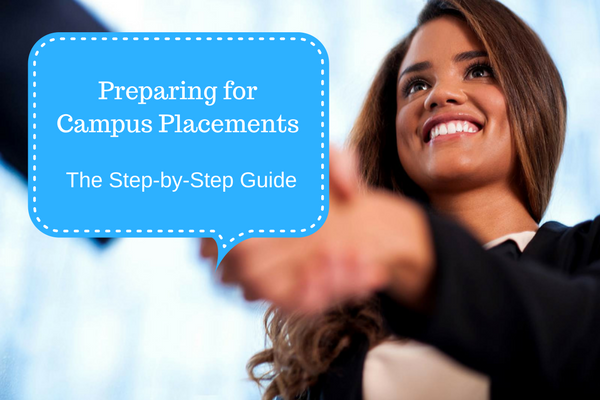

If little steps are what it takes to lay the road to a successful career in life, then the gait with you take each step, matters. A lot. This holds true in real life and in all steps that you take towards a career.
And that’s the arc we are trying to chart out today, through a journey that most job aspirants go through in college – campus placements. While we have covered the basics on the placement exercise, which conventionally takes places in the last two semesters of your college (generally semester 7 and 8 in an engineering college), it’s time to take the dialogue further.
Preparation Tips for Campus Placements
A step-by-step list of placement preparation tips and strategies (when it comes to campus placements), can be broken down by each stage of this process. While we promise to dive deeply into some of these segments individually in our subsequent blogs, here is a condensed version of these strategies – in one place. So, come, let’s find out how to prepare for campus placements –
1. Aptitude Tests:

A skill assessment test, often in the form of an aptitude gathering exercise is a formative first step in most of the campus placement exercises. Be it a pen and paper exercise (often a multiple-choice questionnaire with an OMR sheet) or a computer-aided test, executing one flawlessly requires preparation in the right stream.
In an earlier exploration, we laid out 15 preparation strategies for skill assessment tests. Here we lay down the 5 basic steps you need to take to perfect your preparation:
a. Know what you’re being tested for:
Generally, aptitude tests and skill assessment exercises cover the following areas:
- Communication Skills (generally English)
- Logical Reasoning
- Quantitative Ability
- Domain knowledge
We have earlier understanding these areas in the perspective of the AMCAT Test, the syllabus, sample papers and more, this time, it is imperative to take a step back. Know why you’re taking the test and what combination of traits from your assessment would translate best for you (Nods to traits from assessment tests – thanks, Harvard Business Review)
And then, move to the next step.
b. Gather opinions:
Talk to test-takers who have gone through an earlier exercise for the company or role that you’re slated for. Each company, individually, looks for dominance in particular traits, especially soft skills like Learnability.
c. Practice. A lot:
Take practice runs for all of these skill assessments, by accessing different mock tests for these areas. Go through your feedback reports and make a conscious effort in improving on recurring weaknesses. Apart from online skill assessments, consider working with resources like Practice Set books, practice papers and sample papers.
d. Work on core subjects, equally:
Different companies (technical and non-technical) give different weightage to skill assessment modules. However, one cannot forget that your competence in your core subject will remain at the centre of your chances to make it to round 2 (you have been studying it for some time!)
e. Take Feedback seriously:
Most of the mock tests and exercises end on score aggregates and feedback outlines. Go through yours in depth, take notes and work on your preparation accordingly. And then refine your answers accordingly.
This, in fact, is an observation which we have seen from our AMCAT test takers as well, especially those who give the campus variant of the AMCAT test – choosing to give the test two times and improving on inputs from the first session’s feedback report.
2. Group Discussion:

A group discussion round, in a campus placement exercise, is a round where the interviewer/interviewers get to observe a set of candidates and see how they would react in situations or communicate over their convictions in a problem-solving mode. Preparing for these requires work on these aspects:
a. Clarity of thought:
Comprehension of a situation, working through a logical argument and presenting it adequately are the three traits you need to showcase in this case. And how do you do that? Constant work on your thinking processes and a solution-based thinking approach take time to build – start with treatise like the critical thinking approach and move towards an analysis-based approach in real life.
b. Work on your communication skills:
Clear presentation of your ideas and thought process is the automatic step 2 for any group discussion. Ace yours by working with these factors in mind:
- Who is your audience
- What is the problem you’re discussing
- What is the language (tone, jargon) that you’re communicating in
- Who benefits from a solution and how does yours impact them
- What are the salient points that everyone else is raising
c. Address issues in comprehension:
A GD isn’t just about presenting your viewpoint – it’s a mindshare, a conversation, aimed at coming up with the best possible solution to the situation at hand. And to ace that, you need to take notes. The mental kind. Immediately.
Acknowledge (to self) that everyone here has something important to say and add to the puzzle you’re working on. Take your cues from everyone else, including the interviewer. And build on your responses accordingly.
3. Panel Interview:

Used interchangeably as a screening round with the group discussion, the core component here is that you’re facing a set of interviewers, ready to interact with you. The approach is a little formal in tone, vis a vis the group discussion, though it can easily be a test of your situational awareness, clarity in thought, communication and judgement skills.
While this is a topic we have delved in before (see our piece on How to Handle yourself in a Panel Interview) – let’s break it down for simplicity here. This is how you prepare for it:
a. Exercise clarity in thought
Work towards a clear thinking pattern – it will help in life in more ways than one. Scroll up to look into my two cents on the subject.
b. Work on Interview preparation tips
Yes, you can’t mug up everything – and an interview is supposed to be a reflection of who you honestly are. However, in practicality, a panel interview would have two or more panellists judging your responses on a few open-ended questions than you can mentally review and have ready answers for.
c. Safeguard against common interview mistakes:
We err. We’re human. And few of us realise that we end up making some of the most common job interview mistakes, when it comes to facing an interview panel.
These include:
- Inadequate research (Company + Domain)
- Body language missteps
- Non-verbal cues
- Inadequate communication skills
- Personal presentation
4. Technical Round:

The technical round is a specific interview/assessment or presentation to showcase how good you’re in your core, with your languages (the programming kind) and what you would exactly bring to the job at hand. It can be an interview with the project manager or supervisor, it can be an assessment on your core subject or a situational test.
The best ways to prepare for a technical round or technical interview, therefore, are a sum total of all the preparation you would do for campus placements. Here is the step-by-step guide for working it in style:
a. Background research:
Begin with the areas/domains that the company works on and the common challenges it can face in terms of products/services and their execution. Dive into Quora, Glassdoor and other sources for interview experiences with the company or its closest competitors. And always brush up on the products that the company offers.
b. Practice coding challenges:
More often than not, you would be asked to code or work on a solution to a technical problem. And it’s not just that you arrive at a solution – your execution should be clear and comprehensible. Work on multiple practice sets for these:
- Q&A Trivia Sessions
- Take Home Coding Challenges
- Pair Programming
- Whiteboarding
Based on Quora inputs, you can consider practising for technical rounds with Project Euler, Interview cake (specifically for software engineering problems) and Interviewing.io. You can also practice mock whiteboard exercises.
Similarly, you can work on practice sessions more conducive with your core subject and request for questions in that segment.
c. Prep your Interview strengths:
At the end, a technical interview is also an interview format; conducted face to face, online, on video (think Skype) or telephonically. Prepping for it with the aid of mock interview formats, like the mock AI is also a good way to gear your practice quotient.
5. HR Interview:

The HR interview is a case of conviction, where you need to convince the HR personnel, checking you for possible red flags, that you’re the best fit for the role at hand. To prepare for this, you need to work on similar zones, as we have already mentioned above, albeit in a different context.
a. Background research
Research the role, the company, it’s market, products and close competitors, as well as the general domain in which it exists. And apply that knowledge to your HR interview, by showcasing how involved and enthused you’re about the current opportunity.
b. Preparing for common interview questions
A topic we have explored earlier with this blog, it counts if you have worked on your responses for commonly put up interview questions. Even if you have only laid out the outlines.
c. Keep your things in order:
A day before the interview, prep up by putting together your documents, your interview attire, going through your notes. Next, bring out your positive attitude and cheer and step out with your best foot forward. And you’re ready for it all!
A series on campus placements preparation is incomplete without the guidance of a core focal group – which for us, are our students. Thanks for getting through the entire piece. We would love to hear from you on what you thought about it. Also feel free to share your own campus placement experiences with us in the comments section below.


























Great article!
I think its very tough for students to prepare for campus placements as we can see there is more competition among all for getting job or getting placed in top companies. so, for that preparing for campus interview is the most important task for candidates. You have shared a great article here over how to get prepare for campus interview and it will be very useful for all candidates. Thanks a lot!
Sir,how to prepare for placements from beginning itself??????
thanks for sharing such types of post
great article
Great article ,I hope it will help me as well as others who visit this article ,specially for fresher like me.what I think is most important for campus placement is soft skills and then technical knowledge and rest of the things are easy to do everyone can do but if you lack in technical and soft skill then you can’t get campus placement .as it is very very easy in comparison to the off campus placement because you know if you belong from a good college then it’s a good opportunity for you to get job otherwise for off campus placement most of the person struggle too much to get a job because most of the time what happens that we apply for a company then after a long time we get the message that we can give the test on this date but then after that thing
becomes very difficult.campus placement process is too smooth and if you are good if your capable then definitely you will get placed this is what I personally think.
Thank you, Imran for an elaborate and thoughtful sharing. All the very best towards your endeavours.